South Africans have paid tribute to Hugh Masekela, the legendary jazz musician and activist, who died on Tuesday aged 78.
The South African president, Jacob Zuma, said the nation would mourn a man who “kept the torch of freedom alive”. The arts and culture minister, Nathi Mthethwa, described Masekela as “one of the great architects of Afro-Jazz”. “A baobab tree has fallen,” Mthethwa wrote on Twitter.
A statement from the trumpeter’s family said Masekela “passed peacefully” in Johannesburg, where he lived and worked for much of his life, on Tuesday morning.
“A loving father, brother, grandfather and friend, our hearts beat with a profound loss. Hugh’s global and activist contribution to and participation in the areas of music, theatre and the arts in general is contained in the minds and memories of millions across six continents,” the statement read.
Relatives described Masekela’s “ebullient and joyous life”.
Masekela had been suffering from prostate cancer for almost a decade. He last performed in Johannesburg in 2010 when he gave two concerts that were seen as an “epitaph” to his long career and played at the opening ceremony of the football World Cup. Masekela toured internationally until 2016.
South African social media was flooded with tributes to “brother Hugh”, whose career and work was closely intertwined with the troubled politics of his homeland.
The singer Johnny Clegg described Masekela as “immensely bright and articulate … an outstanding musical pioneer and a robust debater, always holding to his South African roots.”
Masekela was born in Witbank, a mining town in eastern South Africa, and was given his first trumpet by the anti-apartheid activist archbishop Trevor Huddleston, who formed a pioneering jazz band in Soweto in the 1950s that became a launchpad for many of South Africa’s most famous jazz musicians.
Masekela went on to study in the UK and the US, where he had significant success.
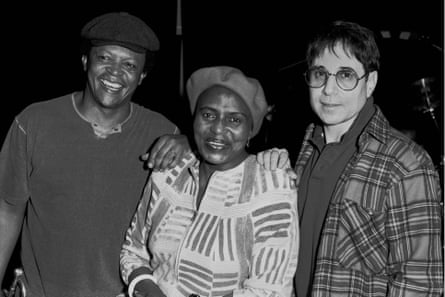
As well as forming close friendships with jazz legends such as Miles Davis, John Coltrane and Charles Mingus, Masekela performed alongside Janis Joplin, Otis Redding and Jimi Hendrix in the 1960s.
He returned to Africa where he played with icons such as Nigeria’s Fela Kuti, and in 1974 he helped organise a three-day festival before the “Rumble in the Jungle” boxing clash in Zaire (now the Democratic Republic of the Congo) between Muhammad Ali and George Foreman.
In 1976, the man who became known as the father of South African jazz composed Soweto Blues in response to the uprising in the vast township. He toured with Paul Simon in the 1980s while continuing his political engagement, writing Bring Him Back Home (Nelson Mandela) in 1987. The song became an anthem of the anti-apartheid struggle.
TimelineHugh Masekela timeline
Show
Masekela is born near Johannesburg to a health inspector father and social worker mother. He sings and plays the piano as a child. At 14, he sees the Kirk Douglas film Young Man With A Horn and is inspired to take up the trumpet.
At school, Masekela played in South Africa’s first youth orchestra, Huddleston Jazz Band. In 1959, he recorded the first album by a South African jazz band alongside Abdullah Ibrahim and Jonas Gwangwa. In the same year, he played in the orchestra of hit musical King Kong.
The ANC are banned, and after supporting the organisation for many years, Masekela leaves South Africa for London. He then moves to New York, where he meets Louis Armstrong and Dizzy Gillespie.
By the late 60s, Masekela was living in California. In 1967, he played at Monterey festival alongside Janis Joplin and Otis Redding. In 1968, his single Grazing in the Grass reached no 1 in the US.
Masekela returns to Africa in the early 70s, spending time with musicians including Fela Kuti. He organises the Zaire 74 concerts with US record producer Stewart Levine to coincide with the Muhammad Ali/George Foreman “Rumble in the Jungle” boxing title fight. In 1980, he moves to Botswana.
Masekela joins Paul Simon for his Graceland tour. Simon’s album was partly recorded in South Africa, and the tour incites protests in London due to the cultural boycott against the country.
Masekela returns to South Africa following the end of apartheid and the release from jail of Nelson Mandela. In 1996, he plays for the Queen and Mandela – by then elected the country’s first black president – during the latter’s state visit to Britain.
Masekela performs at the opening concert of the world cup in South Africa. In 2012, he rejoins Paul Simon for a tour celebrating the 25th anniversary of Graceland.
James Hall, a writer and broadcaster who spent time with Masekela in the 1990s, said he “could have prickly personality” at times “due to the tension and frustration of being away from his own country for so long”.
Masekela was briefly married to Miriam Makeba in the 1960s and remained on good terms with the South African singer after their divorce. “They had a wonderful friendship and were very, very close,” said Hall, who co-wrote Makeba’s autobiography.
Masekela refused to take citizenship anywhere outside South Africa “despite the open arms of many countries”, said his son, Selema Mabena Masekela, on Tuesday.
“My father’s life was the definition of activism and resistance. His belief [was] that the pure evil of a systematic racist oppression could and would be crushed. Instead he would continue to fight.”
After more than 30 years in exile, Masekela returned to South Africa in the early 90s after the release of Nelson Mandela from prison and the end of apartheid.
Masekela had many fans overseas. “Hugh Masekela was a titan of jazz and of the anti-apartheid struggle. His courage, words and music inspired me … and strengthened the resolve of those fighting for justice in South Africa,” said Jeremy Corbyn on Twitter.
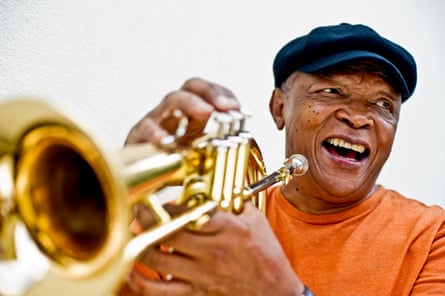
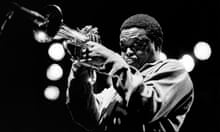
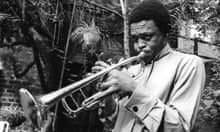
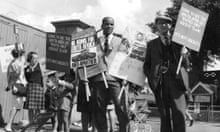



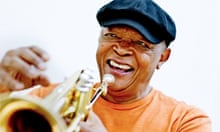
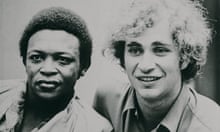
Comments (…)
Sign in or create your Guardian account to join the discussion